Enhancing natural environment
TML acknowledges and understands the impact of its operations on the natural ecosystem where it operates.
For the automotive industry, environmental impacts can be classified into two primary buckets – one, the impact of manufacturing processes, two, the environmental impact throughout the operational life of vehicles. In addressing the second, TML has undertaken several initiatives and is proactively foraying into the non-conventional fuel and electric vehicles space.
In addressing the environmental impact of its operations, it practises Reduce, Recycle, Recover and Refurbish as recommended by the Tata Code of Conduct. It works towards increasing energy efficiencies, minimising carbon emissions, reducing waste, enhancing biodiversity and optimising water usage.
SOLAR ROOFTOP INSTALLATION AT PUNE COMMERCIAL VEHICLES BUSINESS UNIT
To commemorate the National Energy Conservation Day (14 December), the second phase of the 2MWp Rooftop Solar PV project was inaugurated at the Commercial Vehicles Business Unit (CVBU), Pune, in 2018-19.

The Safety, Health and Sustainability (SH&S) Committee at the Board of Director level oversees the environmental performance of TML every quarter.
The SH&S Councils at the business level, supported by the SH&S Apex Committee at plant level, are responsible for reviewing the performance every month. All TML plants have a separate Environment department which is responsible for implementing Environment Management Programmes.
ENERGY CONSERVATION AND CLIMATE CHANGE MITIGATION
TML has implemented Energy Conservation (EN-CON) initiatives at all seven plants to minimise energy consumption.
Several process improvement initiatives have been undertaken at the paint booth, weld shop and press shop of the Pune PV plant. Such initiatives include the installation of LED lights, the optimisation of blower speeds, the installation of Variable Frequency Drives (VFDs) and the use of motion sensors. TML is also a signatory to RE 100 and is investing in renewable energy through rooftop solar, hybridwind and solar installations. In addition, it will continue to source renewable power from the grid in line with the regulatory policies/frameworks and tariffs in the States where it operates.
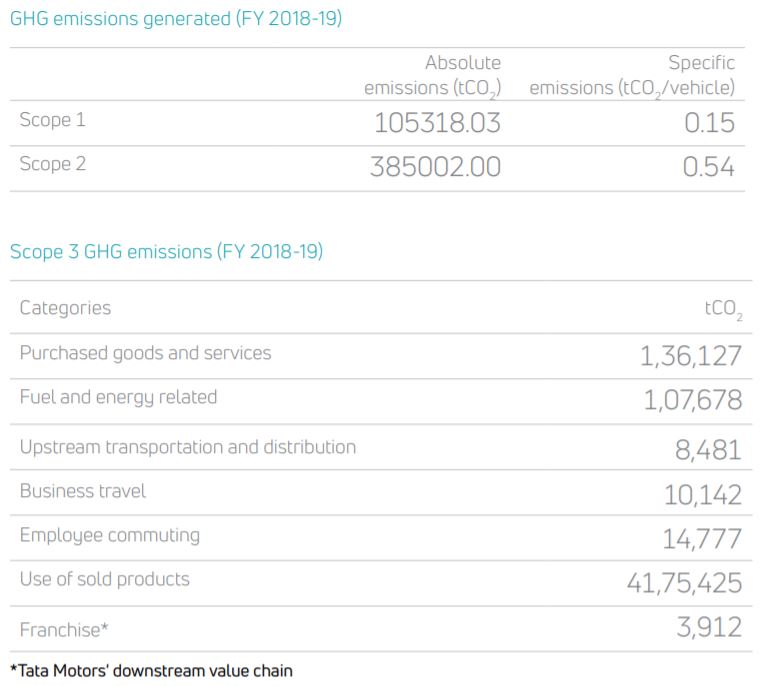
Nurturing long-term relationships
WASTE REDUCTION AND REUSE
TML's plants are vertically integrated. While it disposes of waste as per regulatory requirements, it adopts a threepronged approach to waste management including minimisation, recovery and recycle, and development and adoption of eco-friendly waste disposal methods. In order to reduce the waste burden on landfills, TML has taken steps such as the conversion of paint sludge into secondary paints, which can be used in-house or in the supply chain for casting and frames.
CIRCULAR ECONOMY – ProLife BUSINESS
TML’s ProLife business is a pioneering after-market product support strategy for customers. The use of Tata Motors Prolife aggregate ensures original equipment-like vehicle performance even after the first lifecycle. The customer receives reconditioned aggregates in exchange for old aggregates.
In FY 2018-19, 32,092 engines were reused or recycled (up by 19% over the previous year) under the take-back programme, resulting in revenue of Rs.240 crore. The ProLife business has maintained the energy consumption level at 74kWh per equivalent engine for remanufacturing since FY 2011-12.
Relations with suppliers, vendors, dealers and customers have a significant impact on operations. TML collaborates and creates value for them through engagement programmes, knowledge exchange programmes, sharing technical knowhow and advocating global best practices.
In addition to engaging with business partners, interactions with the communities residing near TML's plants and operations are of great significance for its social license to operate.
ENGAGING WITH SUPPLY CHAIN PARTNERS
TML relies on a large network of suppliers and dealers. It engages with its supply chain on a range of issues through various departments such as Engineering Research Centre, Strategic Sourcing and Purchase and Supply Chain. TML's Supplier and Dealer Codes of Conduct ensure ethical and sustainable practices across the value chain. It has developed vendor parks at its new manufacturing locations to ensure emission reductions linked to logistics as well as to increase local employment. In its endeavour to minimise the ecological and social impacts of its supply chain, TML has taken up the Sustainable Supply Chain Initiative. TML has been adopting a systematic approach since FY 2016-17. This includes sensitisation of its supply chain on Environmental, Social and Governance (ESG) issues through formulation of Guidelines, preparation of data templates, conducting workshops for suppliers and training sessions for local TML’s purchase and supply chain team, data collection from suppliers and on-site sustainability assessment of suppliers. TML embarked on this initiative by shortlisting its top 200 suppliers on the basis of share of revenue and ESG criticality (80/20). As a part of this initiative, TML has covered a cumulative of 233 suppliers – 52 in FY 2016-17, 66 in FY 2017-18 and 115 in FY 2018-19.
Taking a step further, TML has extended this initiative to its downstream channel partners and authorised service stations in FY 2018-19. It has developed sustainability guidelines and conducted sensitisation sessions for dealers across different locations in India. It also develops customised data templates and conducts detailed site assessments to build capacities and motivate channel partners and authorised service stations to integrate sustainability into their business practices. During the year, TML has covered a total of 237 channel partners, conducted 15 sensitisation workshops and assessed 27 dealers.
ENCOURAGING SUSTAINABLE PRACTICES AT SUPPLIER SITES
TML encourages its supply chain partners to fulfill their energy requirements from renewable sources. Minda Stoneridge, a supplier covered under the Sustainable Supply Chain Initiative, has installed a rooftop solar plant with a generation capacity of 741 kW. As a result of this installation, they have achieved 12% reduction in their carbon emissions in FY 2018-19.
Being partner of choice for communities
At the Tata group, the spirit of giving reflects in every business decision. The group's core values and community-centric approach form the bedrock of TML's CSR initiatives. TML continuously aligns our strategies to meet national and global development goals.
Guided by the Tata Code of Conduct (TCoC), TML plans its actions for meeting its stakeholders’ needs.
Programmes under the Aadhar initiatives are focused on the marginalised Scheduled Caste (SC)/Scheduled Tribe (ST) communities.
Health initiatives (Aarogya) focus on addressing malnutrition in children between 0 and 6 years of age. Apart from providing nutritional and dietary supplements to the affected children, TML focuses on inducing behavioural changes in communities, especially young mothers and parents, through awareness sessions and by providing ante-natal and post-natal services. In addition, it carries out curative healthcare services where the communities are served through diagnosis, administration of generics medicines and consultations.
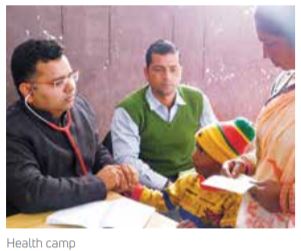
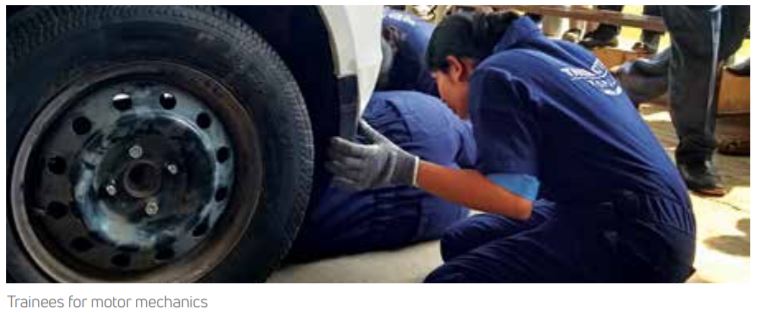
Access to safe drinking water is another issue that TML's initiative Amrutdhara aims to address.
Impact of health initiatives
TML's health programme has benefitted 3,81,437 people. Over 90% of the malnourished children are now in the healthy category and there has been a positive change in the knowledge, attitude and behaviour of the communities on health.
TML strengthened the institutional delivery mechanism by enhancing capacities of Government health personnel on one hand, while mentoring communities to take ownership of programmes on the other.
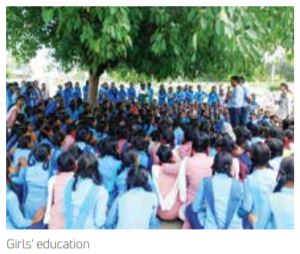
Educational programmes (Vidyadhanam)
are engineered to bring holistic development in students at the secondary school level.
TML has adopted a targeted approach by instituting need-based rolling scholarships/financial support for financially challenged students, organising support classes for difficult subjects, value-based life skills, sports and other co-curricular activities and plugging gaps in infrastructure at schools.
Impact of education initiatives
TML has touched the lives of 1,46,894 students. These initiatives have led to an improvement in the pass percentage of government schools, from 55% in 2015 to 80% in 2019. Average score of the students increased by 5% and 44% of the students secured more than 60% marks in their Class X board examinations in 2019.
Employability or skills development programme (Kaushalya) focuses on training unemployed youth in three segments – auto trades, non-auto trades, and agriculture and allied activities. In Auto Trades, TML focuses mainly on skills in driving and motor mechanics, where Tata Motors as an organisation has domain expertise and business connect. On completion of their training programmes, most of which are National Skill Development Corporation (NSDC) certified, they find ready employment either in the Tata Motors ecosystem or in the open market. TML also engages with community-based groups of women and farmers and help them earn supplementary income through its agriculture and allied programmes.
Impact of employability or skills development programme
During FY 2018-19, TML trained 1,06,038 youths and farmers, of whom over 56% found employment (or are self-employed) resulting in an annual increase in family income by Rs.1 lakh.
As part of its environmental stewardship (Vasundhara), TML is making concerted efforts to increase green cover through sapling plantation on one hand, while enhancing the environmental awareness levels in the community on the other.
Impact of environmental stewardship programme
TML planted 11,17,186 saplings (of indigenous varieties) and ensured a significantly high (85%) survival rate. At a few locations, these places have turned into micro-habitats which host varied species of flora and fauna. TML's environmental awareness programmes aim to sensitise young children and TML has been able to reach out to 89,263 persons.
Rural development programmes aim at improving the overall development of a village through an integrated village development approach. One key element of these programmes is to leverage the synergistically working Government schemes. In doing so, TML has collaborated with 'Sahabhag' – the CSR cell of the Government of Maharashtra – to improve the quality of life of 3,000 tribal communities of the Pathardi gram panchayat in the Palghar district, where 70% of the resources for village development came from the Government.
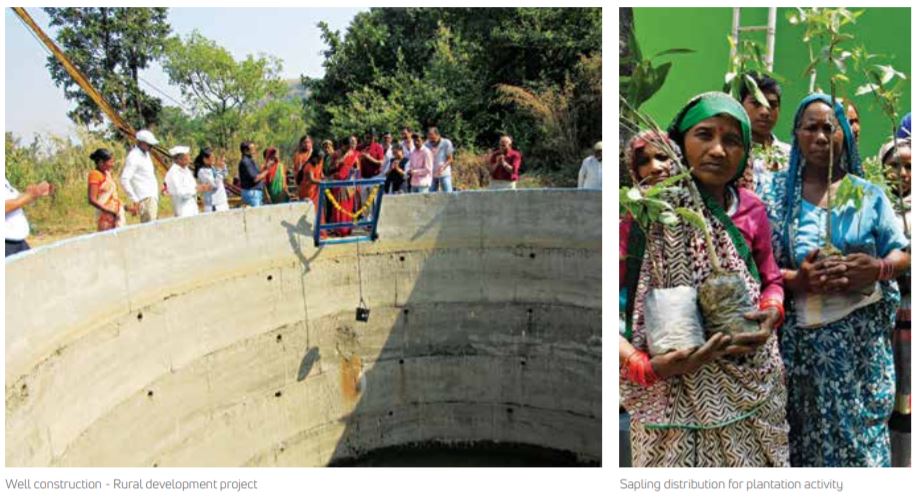
Recognitions for corporate citizenship
TML was the only Indian automobile manufacturer at the Leadership level in the Global CDP 2018 ranking.
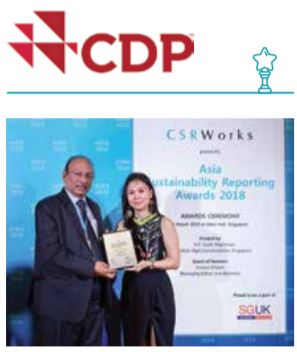
Won Asia’s Best Report Design for 2018 at the 4th Asia Sustainability Reporting Awards (ASRA)
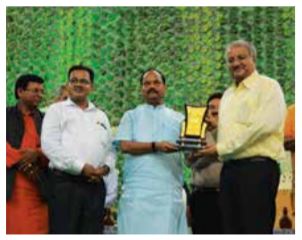
TML Jamshedpur Plant received the first prize for environment management in the Engineering Industry Category
Selected in the Dow Jones Sustainability Index (DJSI) 2018. Recognised as one of the eight sustainability leaders among global automobile companies
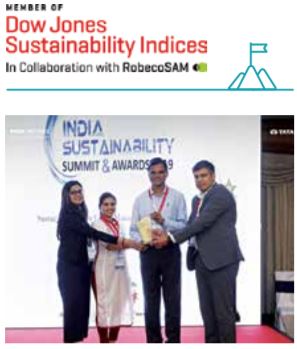
Won the Sustainable Supply Chain Management 2019 Award at India Sustainability Summit and Awards 2019
Recognised as one of India’s top companies for Sustainability and CSR 2018, as per the Responsible Business Rankings 2018, Indian Institute of Management, Udaipur
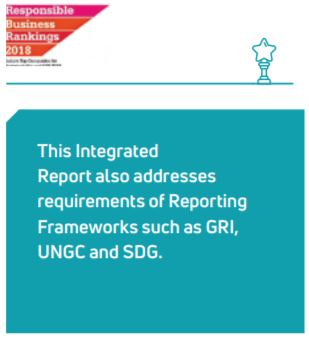
Tata Motors Finance
APPROACH TOWARDS INCLUSIVE GROWTH
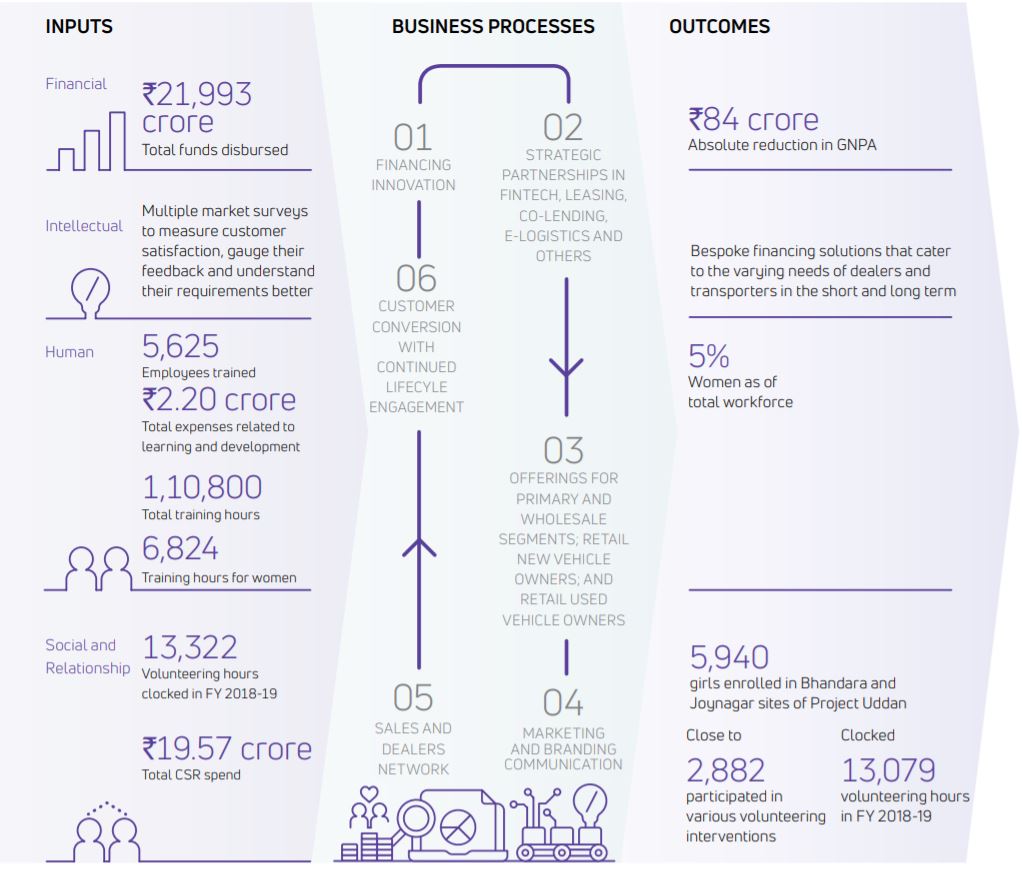
TMFL and TMFSL are NBFCs, with each of them being a subsidiary of TMFHL.
The vehicle financing business is undertaken by TMFL, while the dealer/vendor financing business and used vehicle refinance/repurchase is undertaken by TMFSL.
Tata Motors Finance has a strong footprint across India and operates through its own 260+ branch networks, in addition to Tata Motors dealers’ sales outlets.
Tata Motors Finance has prioritised the Capitals which it measures and manages. Apart from Financial Capital, Intellectual Capital, Human Capital and Social and Relationship Capitals are its priority Capitals
People
Being a service organisation, at the heart of its delivery resides dedicated workforce. As an equal opportunity employer, Tata Motors Finance strives to create a work environment for its employees which would make it their employer of choice. There are a multitude of initiatives that it undertakes to encourage diversity and to provide learning and development opportunities to all employees.
KEY VALUE-ENHANCING ACTIVITIES
Encouraging diversity
Tata Motors Finance launched – BRAID – a diversity campaign and created a Gender Diversity Committee in the organisation. Under the aegis of this programme, Tata Motors Finance revised its Maternity Policy (child care leave, extended maternity leave, nursing breaks and so on) and Women Mentoring Programme. It has also devised ways for additional incentives for referral of women candidates for recruitment. It focuses on building a safe working environment for women in the workforce by providing them safer transport facilities.
Facilitating learning and development
To keep employees abreast with the market requirement and to facilitate their continual growth, Tata Motors Finance has developed several training programmes.
Spin Selling Conversation - is an intense, immersive and engaging programme that incorporated real-world sales conversations.
Romancing the Balance Sheet was developed for senior leaders on basic concepts of finance management, managing profitability, understanding cash flow, managing working capital and evaluation of financial performance.
Master class on Mentoring - was a workshop for identified senior mentors to guide and inspire select high-potential employees
All-in-One Mandatory eLearning Module (2018-19)
was a comprehensive module on guidelines and regulations. It included TATA Code of Conduct (TCoC), Anti-Money Laundering (AML), Prevention of Sexual Harassment (POSH) and Information Security Awareness (ISA),
Community engagement
Tata Motors Finance engages with communities by reaching out through societal and environmental interventions or employee volunteering efforts.
Tata Motors Finance's flagship programme, Project Uddan, is now active in three locations . This is an 'adolescence to livelihood' programme and comprises holistic development, remedial education, scholarships and livelihood programmes. IMPACT, the employee volunteering programme stands for #itisIMPortanttoACT.
KEY VALUE-ENHANCING ACTIVITIES
During FY 2018-19, Project Uddan was launched at Bhandara, Joynagar and Kurnool. At present, it is running in 65 villages in Bhandara, Maharashtra and 15 schools in Joynagar, West Bengal. Approximately 6000 girls are covered in this project.
IMPACT - encourages employees, their families, customers and dealers to participate. In FY 2018-19, volunteering causes included promoting sustainable living; teaching; engaging with children from marginalised communities; and tree plantation; among others.